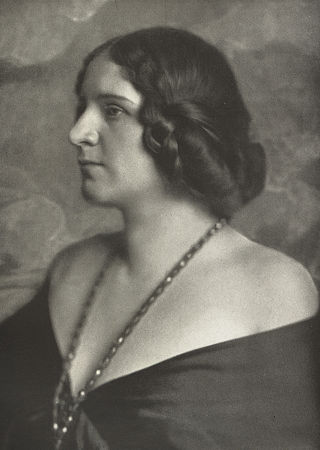Related Research Articles

Nikolaus Lenau was the pen name of Nikolaus Franz Niembsch Edler von Strehlenau, a German-language Austrian poet.

Jan Ladislav Dussek was a Czech classical composer and pianist. He was an important representative of Czech music abroad in the second half of the 18th century and the beginning of the 19th century. Some of his more forward-looking piano works have traits often associated with Romanticism.
Maria Anna Stubenberg was a German composer who used Hungarian and gypsy folk tunes in her compositions.
Emma Wooge was a German composer and singer born in Hamburg. She studied with Eduard Behm and Richard J. Eichberg. Between 1880 and 1882, Wooge was a mezzo-soprano at the Hamburg State Opera. She sang in the chorus for the 1882 performance of the Brahms Requiem in Hamburg, where she met Johannes Brahms. In 1883 she moved to Darmstadt to sing for two years at the Hoftheater, then moved to work at the Leipzig municipal theatre from 18 August 1885 to 1 July 1886. After leaving Leipzig, she worked as a singing teacher in Berlin until her death.

Elsa Laura Seemann von Mangern von Wolzogen was a German composer, lute player, and singer. She was born and grew up in Dresden, where her family owned a guesthouse which entertained well-known artists and scholars like Arthur Rubinstein. Elsa married Ernst von Wolzogen in 1902. Ernst had opened the 650-seat Buntes Theater in Berlin in 1901, one of the first cabarets in Germany. Elsa often sang and accompanied herself on lute at the theater, where Viennese composer Arnold Schoenberg conducted the house orchestra.
Caroline Schneider Wiseneder was a German composer and music educator who developed a musical notation system for the blind, as well as a kindergarten music curriculum. She was born in Braunschweig, and married an opera singer named Wiseneder. She founded several singing societies, in addition to the Wiseneder Music School for the Blind in 1860, which became the model for several schools throughout Germany. Her method for teaching instrumental music to young children was adopted by the national kindergarten movement established in Germany about 1873. Among other teaching tools, Caroline used toy orchestra instruments which were carefully tuned to harmonize together. She believed that children should always be accompanied by an instrument when they sang. After her death, a marble bust of Caroline was placed in the Braunschweig town library in honor of her achievements.
Ellen Florence Williams Whitlock was a British composer, conductor and educator who was known professionally as E. Florence Whitlock.
Princess Julie Furstin von Waldburg-Wurzach was an Austrian composer who published over 60 works for voice and/or piano. She was born in Vienna to Count Frans and Frantiska Dubsky von Trebomyslicz. In 1858, she married Prince Eberhard Waldburg-Wurzach, becoming his second wife. They had two daughters, Marie and Elizabeth Sophie.
Jeanne Emilie Virginie Vignery was a Belgian composer, teacher, and violinist who published her compositions under the name "Jane Vignery." She is best remembered today for her Sonata for Horn and Piano, opus 7.
Maria Vespermann Gorres Arndts was a German composer, writer, and painter who sometimes used the pseudonym "Carl Pauss." Her music was also published under the names "Maria Gorres" and "Maria Arndts."
Anna Teichmüller was a German composer and teacher who set the works of many poets, especially Carl Hauptmann, to music. She composed most of her works at the Schreiberhau artist colony.
Else Streit was a German composer, pianist, teacher, and violinist.
Daisy Elna Sherman was a composer, musicologist, and teacher with a special interest in Thomas Hardy.
Sophie Seipt, also seen as Sophie Seibt (1812-1889), was a German composer and arranger who wrote several pieces for cello and piano.
Anna Marie Wilhelmine Antonie Leopoldine Benfey Schuppe was an Austrian author and composer who wrote songs, operas, and music for theatre. She published under the names Anna Benfey Schuppe and Anna Benfey.
Erna Schorlemmer Loebell was a German composer who published ballet music, marches, music for piano, and songs under the name Erna Schorlemmer and the pseudonym Erny Chaloix.
Amalie Karoline Luise Scholl Gatspar was a German composer who wrote songs and works for piano. She published under the name Amalie Scholl.
Frieda Schmitt-Lermann was a German composer and pianist who wrote music for orchestra, television, theatre and voice.
Elise Kratky Schmezer (1810–1856) was a German singer and teacher who composed one opera and many songs.

Maria Elisabeth, Countess of Schlick was a Bohemian-born German composer and poet. She composed music for lieder and also wrote poetry that other composers set to music. She published under the name Countess Elise Schlick or Gräfin Elise Schlick. Although Schlick is often described as German, some sources list her birthplace as Prague and her birth year as 1792.
References
- ↑ Heinrich, Adel (1991). Organ and harpsichord music by women composers : an annotated catalog. New York: Greenwood Press. p. 320. ISBN 978-0-313-38790-6. OCLC 650307517.
- ↑ The Harmonicon. W. Pinnock. 1826.
- 1 2 3 "Hofmeister XIX". hofmeister.rhul.ac.uk. Retrieved 2023-03-20.
- 1 2 3 Cohen, Aaron I. (1987). International encyclopedia of women composers (Second edition, revised and enlarged ed.). New York: Books & Music USA Inc. p. 620. ISBN 0-9617485-2-4. OCLC 16714846.
- ↑ Stewart-Green, Miriam (1980). Women composers : a checklist of works for the solo voice. Boston, Mass.: G.K. Hall. p. 64. ISBN 0-8161-8498-4. OCLC 6815939.
- ↑ Hughes, Melanie. "LibGuides: Ars Femina Archive: Scores". libguides.ius.edu. Retrieved 2023-03-20.